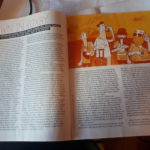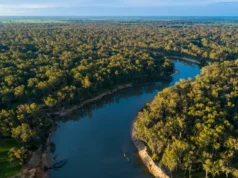Travel story for The Big Issue, published in 2013 and notable for being noticed by BHP, who complained most strongly about it.
Down in Roxby
The South Australian mining town of Roxby Downs turns 25 early this month. Ricky French recalls his own small part in the town’s history.
‘Life is a holiday on earth,’ goes the refrain in one of my favourite Leunig cartoons. Existence is but an exotic sojourn in the suburbs. Our mother is our first tour guide. If we’re lucky we’ll enjoy a holiday romance, have some children as souvenirs, before returning to our natural state: nothingness. Death is just the end of the holiday. Well, you wouldn’t want to stay too long.
The same could be said for Roxby Downs, South Australia. I stayed a bit over 48 hours. A desert town, population 4,500, location: yonder. Big time. ‘Officially opened’ in 1988 solely to house miners at the Olympic Dam mine, it’s celebrating its 25th birthday early in November. It will no doubt dig in to its cake: digging is what Roxby Downs knows best. The town is a kind of forced conglomerate; not so much a town as a collection of unwilling participants, a time-share meeting that you endure for the promise of a free gift at the end. It sits on the edge of the desert, looking out across that vast, horrendous outback. It gorges its fat face on the land and sweats on news of the expansion or contraction of the mine. The edge of an abyss, with views over the barren, geological past that is the empty-headed Australian interior, the land that happily did nothing much for several hundred million years before Roxby Downs showed up.
The Olympic Dam mine, in case you were wondering, does nothing much except hold an estimated $1 trillion worth of copper, uranium and gold. Nothing’s as precious as a hole in the ground, sang someone formerly known as Peter Garrett. If the mine is the sun then Roxby Downs is Mercury. On this tiny planet the people wince, sweat, earn big bucks, grimace and bear it.
Roxby Downs is not governed by the ALP or the LNP but by BHP. Plans to expand the mine were shelved in August last year, amid cost blowouts and declining mega-profits – a symptom, perhaps, of BHP’s “issues of productivity and capital discipline,” as their Chief Executive Andrew Mackenzie later put it – but also predictable environmental concerns.
Four hundred people joined a protest with an unpredictable name, the ‘Lizards Revenge March’, which set up camp at the mine in July 2012. Their stated aims were to (a) protest the expansion of the mine and (b) run a music and arts festival on renewable energy. The march took protesters to the mine entrance (‘The gates of hell,’ as described in their press release), while the music included sets from The Rotary Hoes, Velcro Lobster, Patriarchal Death Machine, Jam Rastaman, Monkey Marc and Jungle Dave. The protest group claimed police heavy-handedness at the Tuesday cricket match. They also daubed slogans in zinc on their chest, which became caked in dust. They filmed the police; the police filmed them. They stood up for the Aboriginal people. They slept in tents under a massive deposit of silver stars. They said: “This battle will not be fought in parliament but in the desert”. After much speculation, cricket and desert reggae, BHP announced it would abstain from expanding their bludgeoning of traditional Arabunna land…for now.
I WAS in Roxby Downs a couple of years ago as part of a group of foreign bystanders. We were all there courtesy of BHP in one form or another, contracted to help them organise, run and report on a shindig in the community centre – a long-service awards night. Many gold star certificates were handed out: 10 years, 20 years, 30 years. Yes, that’s how long the night would seem to drag. But Roxby Downs needed a good party. The community noticeboard hung in the foyer, hilariously barren – at first I thought the dirt-orange board was an aerial photo of the area. A semi-trailer rolled in from Melbourne, 1300 kilometres away and unloaded red carpet, presumably so the ground inside matched the ground outside.
The halls were decked with big city lights. A huge spotlight was erected at the entrance and when the town faded into the black desert night it cast a blinding white light into the heavens, like a flare launched from a foundering ship. Would anyone hear our screams?
The bash had all the glitz befitting a mining company booze-up; which is to say it had musician Joe Camilleri and writer Peter FitzSimons. Camilleri’s meat-and-potatoes rock suited the iron and ore atmosphere. He was grouchy, playing to mining executives and their wives, but a gig’s a gig. FitzSimons put on a more unexpected display. Huge as a mining truck, he wore his trademark bandana – for once it suited the environment. He sweated and squinted. He looked like a man who had dragged himself into town after being lost in the outback for weeks. Perhaps he had been. He propped himself up on the lectern, contractually mumbling something, presumably hoping his presence went unnoticed. He introduced awards. When each round was over and the lights went down, he would stay glued to the microphone, gazing into the distance, possibly wondering where he was, forcing a minder to usher him off stage. “AND A ONE-TWO-THREE-FOUR!” yelled Camilleri, and so passed the unlikely night.
Rewind 24 hours and we were sat at one of the two pubs in town, watching copper, uranium and gold being transformed into beer. Cigarettes got inhaled by the bucketful in the cramped beer garden. A 50-year-old miner hit me up for conversation. “We call this place Roxby Downer,” he said, draining his glass. Lasers shot inexplicably across an empty dance floor. He leaned closer to be heard over the din and confessed, “I earn $48 an hour”.
But what about entertainment, other than getting tanked? Planned communities are famous for manufacturing fun. The answer was good and honourable: football. The Roxby Miners play in the Far North Football League. From far north come the Coober Pedy Saints, a 450-kilometre return bus journey to take on the Miners. Roxby Downs Oval is the home ground for every team in the league. As luck would have it, I had brought a football from home, and I wandered over to the oval one morning. Although it was bereft of both grass and spectators, you got the feeling all visible signs of life would gather here on match day, pumping the desert air with cheer as the Miners battled the Olympic Dam Devils, the Andamooka Roos, the Hornridge Magpies and, of course, the bus-weary Coober Pedy Saints.
The oval was huge – a desert itself. I kicked some remarkable goals – my feats witnessed only by the goalposts – then took potshots at the scoreboard, partly because it looked unbreakable enough and partly because I liked the sound the ball made as it thumped against the side and bounced back to the dirt to dart off in a direction of its own choosing, like a startled lizard. The coaches’ box looked more like a dog box, the goalposts were skinny, meek, insignificant. Everything was dwarfed and compressed by the oval, the huge sky, the thick, heavy air. Alone in an empty ground, in an empty state in an empty continent. If you ever feel like you need a bit of space, I know just the place.
Miners and interlopers like me stayed in barracks on the edge of town. Each person had a key to a tiny room with a battered TV, a wet shower curtain and a cracked sink. Water dripped from the crack and pooled on the floor. I had no one to tell about it. We ate in the communal kitchen – long tables beneath white lights; quiet, mumbled conversation. It was dark each morning when we arrived – cold, too. The long-term miners pulled their beanies down tight and slowly turned their spoons through their cereal, their families over 1000 kilometres away. Australian Story. I found comfort in all-you-can-eat trifle, Christmas cake with custard, and the thought I would be home tomorrow. One of the lucky ones.
Show over, the entire entourage gathered at Olympic Dam Airport at 8am. FitzSimons had made it off stage and now paced restlessly outside the terminal, talking in quiet and serious tones into his mobile. As a final cruel joke, my seat hadn’t been booked on the charter flight out.
I briefly wondered what it would be like to earn forty-eight dollars an hour, before a boarding pass was thrust into my hand and I was frogmarched onto the spaceship and soon saw an alien land far below me. There it was: Roxby Downs and its overcooked surrounds. Red and singed, ancient and plundered, home to miners, builders, geoscientists, real-estate agents, waddling shoppers, wishful community centres, a few vengeful lizards; not even a dot in the dirt.



